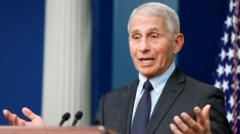The nearly week-long state funeral for Jimmy Carter, who passed away at the age of 100, has commenced with ceremonies reflecting on his life and contributions as the 39th president of the United States.
State Funeral for Jimmy Carter: A Final Salute to an American President

State Funeral for Jimmy Carter: A Final Salute to an American President
Details and attendees for the state funeral events honoring the legacy of President Jimmy Carter
The final farewell for Jimmy Carter is set to unfold over several days as a state funeral, commemorating the influential legacy of the former president. His ceremonies began in his hometown of Plains, Georgia, and will pass through significant locations before culminating in Washington, D.C.
Following his death last month, Carter's casket made a solemn procession on January 4 through Plains, stopping at his childhood home before heading to Atlanta. The public services at the Carter Presidential Center will allow friends and family, as well as the general public, to remember the man who served from 1977 to 1981.
What exactly constitutes a state funeral? A state funeral is a deeply respected national observance for individuals who significantly impacted public life, particularly former presidents. Typically ranging from seven to ten days, these events often take place in both the deceased's hometown and Washington, D.C. The most recent state funeral was held for George H.W. Bush in late 2018.
After the ceremonies in Georgia, Carter's body will lie in repose at the presidential library on January 5 and 6, before being transported to the U.S. Capitol on January 7. Here, the late president will lie in state for public viewing, allowing citizens to pay their final respects. The memorial service at Washington National Cathedral on January 9 is expected to draw numerous dignitaries and will be presided over by President Joe Biden, who was personally requested by Carter to deliver the eulogy.
Attendance at the state funeral is set to include former presidents such as Barack Obama, Bill and Hillary Clinton, and Donald Trump, who has confirmed his presence despite not attending Rosalynn Carter’s funeral last year. The gathered former leaders will pay tribute to their colleague who navigated tumultuous political waters during his presidency.
As an added note, January 9 has been declared a national day of mourning by President Biden, resulting in federal government closures and half-mast flags across government buildings for 30 days to honor Carter's enduring memory. The American public is encouraged to remember and reflect on Carter's contributions as a humanitarian and leader dedicated to public service.
Following his death last month, Carter's casket made a solemn procession on January 4 through Plains, stopping at his childhood home before heading to Atlanta. The public services at the Carter Presidential Center will allow friends and family, as well as the general public, to remember the man who served from 1977 to 1981.
What exactly constitutes a state funeral? A state funeral is a deeply respected national observance for individuals who significantly impacted public life, particularly former presidents. Typically ranging from seven to ten days, these events often take place in both the deceased's hometown and Washington, D.C. The most recent state funeral was held for George H.W. Bush in late 2018.
After the ceremonies in Georgia, Carter's body will lie in repose at the presidential library on January 5 and 6, before being transported to the U.S. Capitol on January 7. Here, the late president will lie in state for public viewing, allowing citizens to pay their final respects. The memorial service at Washington National Cathedral on January 9 is expected to draw numerous dignitaries and will be presided over by President Joe Biden, who was personally requested by Carter to deliver the eulogy.
Attendance at the state funeral is set to include former presidents such as Barack Obama, Bill and Hillary Clinton, and Donald Trump, who has confirmed his presence despite not attending Rosalynn Carter’s funeral last year. The gathered former leaders will pay tribute to their colleague who navigated tumultuous political waters during his presidency.
As an added note, January 9 has been declared a national day of mourning by President Biden, resulting in federal government closures and half-mast flags across government buildings for 30 days to honor Carter's enduring memory. The American public is encouraged to remember and reflect on Carter's contributions as a humanitarian and leader dedicated to public service.






















